Life in Fragile States and the Effects of Mass Migration
Posted on September 19, 2016.
By Meaghan Bogart
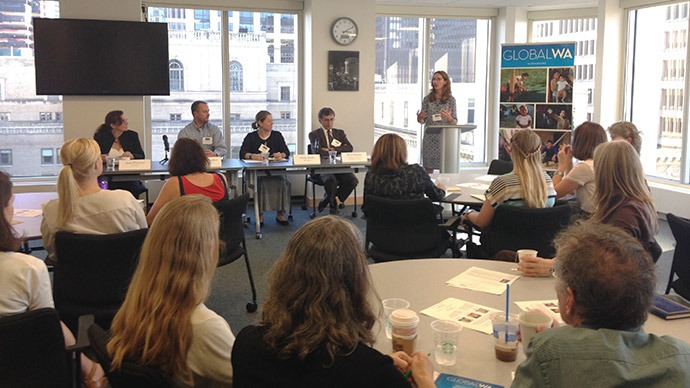
On September 14, Global Washington hosted a panel discussion on mass migration and its effect on our world. Resat Kasaba, Director, Stanley D. Golub Chair of International Studies for UW’s Jackson School moderated the panel. Participants included Anne Peterson, Senior Vice President of Global Programs for Americares; Jonathan Scanlon, Senior Advocacy Advisor for Oxfam America; and Nicky Smith, Executive Director of IRC Seattle. The speakers addressed their leadership in regards to the crisis, and how their organizations are tackling the challenges and opportunities that lie ahead.
Continue Reading
September 2016 Newsletter
Posted on September 13, 2016.
Welcome to the September 2016 issue of the Global Washington newsletter.
IN THIS ISSUE
Letter from our Executive Director
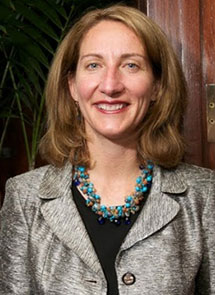
In 2015, 65.3 million people around the world were displaced. This is greater than the combined population of Canada, Australia and New Zealand. While Syrians represent the largest percentage of those displaced, numerous others are fleeing war and fragile civil societies in South Sudan, Yemen, Burundi, Ukraine and Central African Republic, in addition to thousands more fleeing poverty and violence in Central America. Countries lacking strong civil societies, termed “fragile states,” are home to 43 percent of the global population.
This is a global crisis. It will be top of mind for world leaders when they gather this month at the United Nations General Assembly. In addition, President Obama has called for a White House Summit on Refugees to address the myriad of political, social and economic issues associated with mass migration. Political leadership is an essential part of the solution.
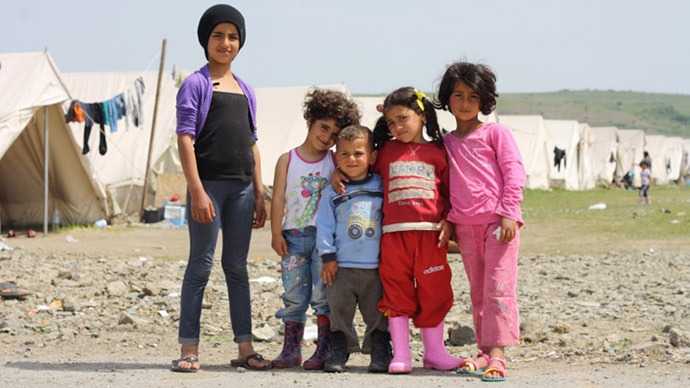
NetHope
Several Global Washington members are on the front lines of the refugee crisis, addressing its root causes. We will be raising the profile of members who work on this issue and providing a “Seattle response” to world leaders gathering in New York and D.C. Please join us on September 14 along with experts from the International Rescue Committee, Oxfam America and Americares for a timely discussion on this topic. I hope you will read on to learn more, attend tomorrow’s event, and add your voice as we tackle this global crisis.

Kristen Dailey
Executive Director
Back to Top
Question of the Month
 Is your organization putting on a big event this fall? Gala? Luncheon? Annual dinner? Tell us about it! We’d love to help spread the word.
Is your organization putting on a big event this fall? Gala? Luncheon? Annual dinner? Tell us about it! We’d love to help spread the word.
Please click here to respond.
Back to Top
Issue Brief
A Global Crisis: Life in Fragile States and the Effects of Mass Migration
By Amanda Pain
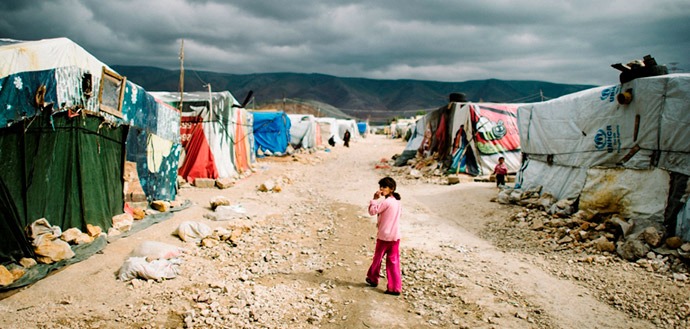
Medical Teams International
Every minute, 24 people are forced to leave their homes. While large numbers, such as 65.3 million people displaced worldwide in 2015, can often be hard to comprehend, 24 people equals a group of co-workers, friends or classmates. Now imagine 24 people displaced every minute of every day, and every day of every year. That is the magnitude of the current migration crisis, and it is a problem unseen since the Second World War.
According to the United Nations High Commissioner for Refugees (UNHCR), the breakdown of 65.3 million displaced persons in 2015 equals 40.8 million internally displaced persons, 21.3 million refugees and 3.2 million asylum seekers. There were 12.4 million people newly displaced in 2015, and 10 million were stateless. The forcibly displaced population today is larger than the total population of the United Kingdom. If those displaced all lived in one country, that country would rank 21st globally by population. And half are children who are often forced to migrate alone.
A majority of those displaced, 86 percent, are from low and middle-income countries and are close to conflict. More than half, 54 percent, are from either Syria, Afghanistan or Somalia. What causes this mass migration? Sometimes it’s natural disasters, which have affected 218 million people over the last two decades. Often people face extreme war and conflict, which drives 80 percent of humanitarian need. Fragile states are home to 43 percent of the global population, 76 percent of whom live in extreme poverty. Two-thirds of the countries considered to be fragile states did not meet Millennium Development Goal 1, which aimed to eradicate extreme poverty and hunger by 2015. If these states cannot reduce conflict and build good governance by 2030, 62 percent of the people living in fragile states will be living on less than $1.25 a day.
One example of a fragile state is Syria, which has been in conflict since 2011. At the end of 2015, 13.5 million people were in need of humanitarian aid, including 6.5 million people who were internally displaced. This ongoing crisis, which has caused so many to flee, has had devastating effects on the Syrian people. Life expectancy has been slashed by more than 20 years, school attendance has dropped by 50 percent, and the country’s economy has contracted by 40 percent.
Countries housing displaced persons are struggling to cope with the influx of people. In 2015, over 1 million crossed into Europe, with 90 percent heading to Turkey, Pakistan or Lebanon. Turkey alone hosted 2.54 million refugees in 2015. According to the International Organization of Migration, 1 million migrants traveled by sea in 2015, and nearly 35,000 by land. Since 2000, 46,000 people have died migrating, with 10,400 of those dying in 2014 and 2015 alone. While aid has increased over the past three years, reaching $28 billion in 2015, the United Nations (UN) was unable to meet 45 percent of country appeals for assistance last year.
In May 2016, UN Secretariat General Ban Ki-Moon hosted the World Humanitarian Summit in Istanbul, Turkey to address how to best reduce refugee and migrant suffering and improve aid delivery. Out of this summit came the Grand Bargain (GB), which pledges to increase funding to local organizations from the current 2 percent to 25 percent by 2020. In addition, the GB is asking donors for more flexibility on where humanitarian aid dollars go, and in turn aid agencies will be more transparent with how donation dollars are spent. Ban Ki-Moon has also ordered the Summit for Refugees and Migrants to take place this month to bring together heads of state and create a blueprint for a better-coordinated international response to the migration crisis.
Parallel to the 71st session of the UN General Assembly, President Barack Obama will host a Leader’s Summit on Refugees. During this September summit, states will commit to broaden and deepen their commitment to funding UN humanitarian appeals, expand resettlement and other legal channels for humanitarian admissions, and facilitate refugee inclusion and self-reliance. Meanwhile, several Global Washington members are focused on the 24 people being displaced every minute, and continue to provide humanitarian aid to those 65.3 million people displaced worldwide.
American Red Cross
As families search for safety across the Middle East and Europe, the global Red Cross network is providing vital humanitarian assistance to those in need. Red Cross and Red Crescent teams are serving tens of thousands of migrants and refugees, including along the Mediterranean and Western Balkans migratory routes in countries of origin, transit and arrival. This critical assistance includes the distribution of food, water, hygiene kits, baby supplies, clothing and first aid kits. Red Cross and Red Crescent teams are also providing medical care and first aid, shelter and psychosocial support. Additionally, migrants who have been separated from their family members have been receiving assistance from the Red Cross Restoring Family Links program to reconnect with their loves ones.
Americares
Among its current programs, Americares is helping vulnerable people caught in the Syria conflict, refugee communities in Jordan, families negotiating the border crisis in the United States, and people in the West Bank, Gaza and Lebanon who have difficulty accessing health services. By providing support to local partners in these communities, Americares is helping refugees and others access critical health care. In Syria, aid from the organization includes more than $7 million in medicine and supplies and support including staff salaries for health facilities that have been targeted by violence. With medicine for diabetes, cardiovascular disease and other chronic conditions, Americares continues to collaborate with partners in the West Bank, Gaza and Lebanon, to help them meet the health needs of vulnerable populations. On the U.S.-Mexico border in Texas, Americares has supplied a structure where families can safely spend the night and access health care after an often lengthy and dangerous journey from Central America. Nearly 10,000 people have used the facility so far.
International Rescue Committee
The International Rescue Committee provides opportunities for refugees, asylees, victims of human trafficking, survivors of torture, and other immigrants to thrive in America. Each year, thousands of people, forced to flee violence and persecution, are welcomed by the people of the United States into the safety and freedom of America. These individuals have survived against incredible odds. The IRC works with government bodies, civil society actors, and local volunteers to help them translate their past experiences into assets that are valuable to their new communities. In Seattle and other offices across the country, the IRC helps them to rebuild their lives.
Medical Teams International
Along with national governments, the United Nations High Commissioner for Refugees (UNHCR), other NGOs and funding partners such as the Bill & Melinda Gates Foundation, Medical Teams International is responding to mass migration/refugees fleeing conflict and disaster with healthcare service and support in Uganda, Lebanon, Greece, and soon Turkey and Tanzania. With a sudden, recent surge in violence in South Sudan, close to 90,000 more refugees are fleeing to camps in Uganda adding to the 300,000 refugees already being served in Uganda. With over 700 Ugandan healthcare staff, Medical Teams is the UNHCR preferred healthcare provider. Medical Teams’ work includes health intake for all incoming refugees, triage, direct healthcare as needed, WASH, Maternal Child and Newborn Health services, nutrition supplementation and work to treat and prevent malaria, and cholera. Over 85% of new refugees are women and children.
Mercy Corps
Powered by the belief that a better world is possible, Mercy Corps partners to put bold solutions into action, helping people triumph over adversity and build stronger communities from within. This means not only delivering lifesaving assistance like food, water or shelter increasingly through cash, but also tackling root causes like communal tensions and hatred, discrimination, gender inequity, social exclusion, lack of opportunity and how life-shaping decisions are taken by power-holders. It means meeting today’s urgent needs while investing in a more resilient tomorrow. Mercy Corps strives to innovate for greater impact, and they understand that communities are the best agents of their own change and local markets are the best engines of long-term recovery. Today, Mercy Corps’ staff of nearly 5,000 is reaching about 30 million people in more than 40 countries around the world.
NetHope
NetHope is an organization that convenes the world’s largest international non-profit organizations (NGOs) and technology giants to help tackle global challenges. NetHope, a 49-member organization, is a catalyst for productive innovation and problem solving in humanitarian crises and conservation work. NetHope is currently engaged in providing Wi-Fi to refugees fleeing persecution, conflict and famine.
RenegAID Innovative Disaster Relief
RenegAID develops educational materials to help people understand catastrophe trauma and learn the differences between everyday language and the language of survival and regeneration. Disaster policies, procedures and plans are cognitively developed prior to a catastrophe. The language of survival and regeneration is not a cognitive language, but rather a language spoken by survivors within disaster. RenegAID advocates for those who speak the language of survival and regeneration, and believes their leadership is key to overcoming the difficulty that aid organizations face in scaling up and delivering timely relief. The catastrophic mass migration our world is currently experiencing cannot be managed using procedures mitigated in past disasters or written in less confusing times. This catastrophe can only be managed by appreciating the existence of two distinct languages and the indispensable leadership from survivors themselves.
U.S. Fund for UNICEF
Sixty-five million children around the world are on the move – running from conflict, poverty and extreme weather, looking for a better life and a place to call home. They are among the most vulnerable people on earth – children on the edge. UNICEF is working on the ground to ensure that programs and policies in response to the migration crisis put the rights and needs of all children first. It is also working to expand humanitarian services wherever they are needed on refugee routes, including providing water and age-appropriate food, and establishing child-friendly spaces, where children can play and benefit from psychosocial support, and women can rest and take care of their babies. At the same time, millions of children are still caught in situations of conflict, natural disaster, poverty and underdevelopment – the main root causes of the crisis – and UNICEF remains committed to supporting sustainable solutions where they are needed most.
World Vision
World Vision has worked in the majority of the world’s fragile states for over three decades to support the most vulnerable children and communities. Since the start of the Syria crisis, World Vision has helped more than 2 million children and adults in Syria, Lebanon, Jordan, Iraq, and now Serbia. In addition to meeting urgent relief needs, the organization works in the world’s broken places on the root causes of fragility that perpetuate extreme poverty and drive conflict and forced migration. From places like Syria and Iraq, to Afghanistan, Somalia and South Sudan, World Vision partners with communities, governments and generous donors to provide food, clean water, child protection, education, jobs and health support. They work for lasting change in the lives of children and the poorest, in the hardest places. Read the recent article from World Vision International’s President and the UN’s Emergency Relief Coordinator on reducing humanitarian needs in fragile states.
Back to Top
Featured Organization
Mercy Corps
By Amanda Pain
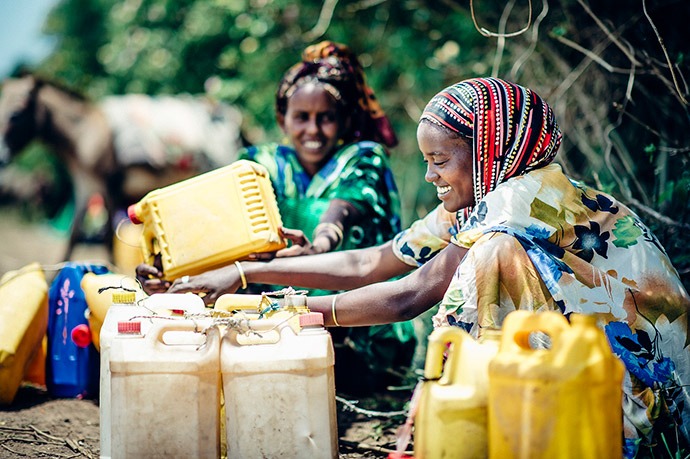
Mercy Corps has helped women in the small village of Jijiga, Ethiopia begin processing milk locally. It is now a higher quality, improving incomes for pastoralists and their families.
Credit: Sean Sheridan for Mercy Corps
Mercy Corps has been delivering humanitarian aid and rebuilding communities since 1979. Michael Bowers, Vice President of Humanitarian Leadership and Response for the Portland-based NGO, believes the mission to alleviate suffering, poverty and oppression by helping people build secure, productive and just communities, has been instrumental in guiding the organization to success.
“We let our mission guide us,” Bowers explained. “A lot of organizations go through mission drift, but our mission is a living will of what we need to accomplish. It has steered us well and kept us steady.”
Mercy Corps, which was co-founded by Global Washington board member Dan O’Neill as Save the Refugees Fund, was started to address the needs of Cambodian refugees after the genocide under the Khmer Rouge. In 1982, the organization began addressing long-term development needs, in addition to delivering emergency relief. Bowers explained that balancing immediate needs with development needs is more of an art than a science. “When we enter a country during an emergency, our strategy is to address both immediate needs such as health, water and shelter, as well as looking at the long term development possibilities,” he said. “Often those development needs have been chronic, and were pre-existing to any disaster or conflict.”
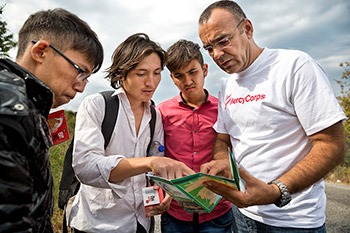
A Mercy Corps team member on the island of Lesvos, Greece shows a map to a group of refugees to help them navigate their location.
Credit: Karine Aigner for Mercy Corps
Bowers admits that it is not always easy to work on immediate and long term needs simultaneously, because donor funding is sometimes only for six to twelve months. “At times there is more public outcry and giving toward large crises, such as the Nepal earthquake in 2015,” he said. “But you can’t do development work in only 12 months.” Mercy Corps advocates for areas that need longer-term aid such as countries experiencing drought and famine (like East Africa), or countries in decades of conflict and violence (like Afghanistan). “We advocate for both funding and structural changes to how the U.S. and foreign governments administer aid,” explained Bowers. “We also advocate for appropriate investment in peacemaking and conflict mitigation activities. The more we engage fragile countries, the more we can reduce poverty and violence.”
One major challenge when responding to a crisis is reaching the affected country quickly. Mercy Corps works in more than 40 different countries today, and 90 percent of its staff is local to the country where aid is being delivered. In times of natural disaster, the organization must be prepared for known high hazard areas, such as countries in Asia that are prone to typhoons and earthquakes. In conflict situations, Mercy Corps often has to negotiate access with combatants and hostile governments to deliver aid. “Whenever possible, we try to be on the ground engaging communities before a conflict occurs. But in a conflict situation, things get complicated fast,” said Bowers. There are, what he called, “black zones” — places like Libya, Northeast Nigeria and Syria, or areas that Mercy Corps has difficulty reaching due to extreme violence that often leads to distrust of foreign NGOs by local people. “Getting into areas of crisis is about being very resilient and trying to work through every operational challenge to deliver aid to those who need it.”
Bowers explained that, during its 37-year history, Mercy Corps has learned that for every year of war/conflict, it takes seven years for a country to recover. Additionally, Mercy Corps has learned unless the root cause of a conflict is resolved, violence will continue to reemerge and the country will remain fragile. Bowers described unstable countries as having unequal distribution of resources. “The sustaining factors of a healthy and peaceful society require that grievances are addressed fairly, there is good governance and an equal opportunity for economic growth,” he said.
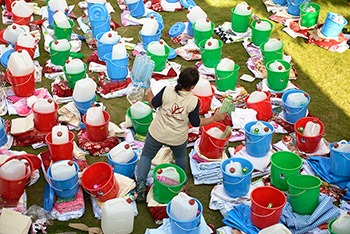
A Mercy Corps team member prepares emergency kits to distribute in Kathmandu, Nepal following the devastating earthquake in April 2015.
Credit: Miguel Samper for Mercy Corps
Mercy Corps will focus on a number of areas over the next fiscal year, including continuing to be prepared and responding quickly to complex crises; conducting research to provide evidence to international leaders that investment in conflict mediation and peace building at the forefront is cost saving when compared to costs post-disaster or conflict; and educating leaders and the public on the importance of emergency response and assistant fragile states. “There are so many movements towards withdrawal,” said Bowers. “We want to make sure citizens understand that Mercy Corps wants to prevent more failed states, and wants to stop those states from turning into large breeding grounds for violence that is exported.”
Bowers believes that Mercy Corps has remained resilient while working in some of the world’s toughest places and has responded quickly to changing environments. He also is proud that Mercy Corps works so closely with local communities and is constantly looking for innovative solutions to problems. “We have to change, we can’t be static,” he explained. “We can’t just assume we know it all. We must continue to be thoughtful and innovative in our work. We know what we do well and we are humble. That is our recipe for success.”
Back to Top
Changemaker
Nicky Smith, Executive Director, International Rescue Committee Seattle
By Amanda Pain
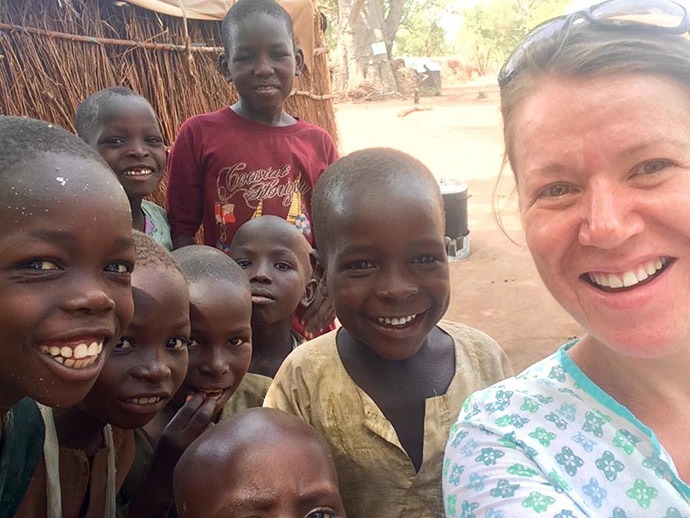
Humanitarian crises are on the rise and there are more displaced people today than at any time since World War II. Nicky Smith, Executive Director of International Rescue Committee (IRC) Seattle, is no stranger to these growing crises. As a humanitarian aid worker she responded to the Rwandan Genocide, the Liberian Civil Wars, and worked in Afghanistan during Taliban rule. And those are only a few of the challenges Smith experienced firsthand.
“In this work you witness a lot of really intense situations,” Smith explained. “I always said to myself that, if at any point this becomes normal or I feel numb to this, I have to stop the work immediately.”
Smith, who grew up in a British family, admits to having an unusual background. She was raised by her mother who grew up in East Africa, and her military father. The two owned a business together in Uganda. “I have always had Africa in my life between my mother’s family and my parents’ business,” Smith recalls. “I also went to boarding school, so I’ve been around international people my entire life.”
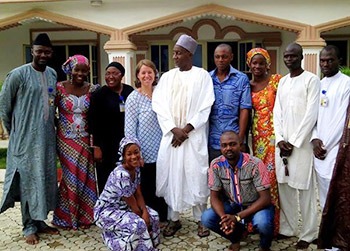 Always interested in public service, Smith decided to take a year off before college to volunteer abroad. She joined a gap year program with Project Trust where she worked at a boarding school for deaf children in Cairo, Egypt. While there, she started volunteering to help African refugees prepare for their resettlement interviews. “I became close friends with some of the refugees, some of whom were my age,” said Smith. “It really stuck me that I had essentially won the birth lottery. The difference in our circumstances was just that I was born in the United Kingdom as opposed to Eritrea, Somalia or Sudan.”
Always interested in public service, Smith decided to take a year off before college to volunteer abroad. She joined a gap year program with Project Trust where she worked at a boarding school for deaf children in Cairo, Egypt. While there, she started volunteering to help African refugees prepare for their resettlement interviews. “I became close friends with some of the refugees, some of whom were my age,” said Smith. “It really stuck me that I had essentially won the birth lottery. The difference in our circumstances was just that I was born in the United Kingdom as opposed to Eritrea, Somalia or Sudan.”
Her year in Egypt, Smith explained, was life-changing. She decided not to attend college and instead started working in international development. Her first job was with Project Trust, managing programs in Uganda. “I will never forget this,” Smith says of the experience. “I was sitting in a camp in Mbarara, Uganda in April of 1994 when the people there started telling me about this thing that was happening across the border in Rwanda – and that thing was the Rwandan Genocide.” Smith describes this as a seismic moment in her life. She decided she needed to go to Rwanda and would shift from development work to humanitarian work.
Once in Rwanda, Smith worked for Children’s Aid Direct (formerly Feed the Children). Living in the city of Butare, she was working to reunite children who had been separated from their parents while fleeing the country. “We had incredibly young children who had been separated from their families. Some of them were babies,” said Smith. “It was a very intense time in Rwanda and a steep learning curve for me, but I knew this was absolutely the work I wanted to do and that it was my calling.”
After leaving Rwanda, Smith went to work for Medecins Sans Frontieres (MSF) where she experienced Afghanistan for the first time. Women’s rights issues aside, Smith explained that Afghanistan is her favorite country to work in because the people are so kind. She was there for over three years and recalls once walking through a refugee camp and experiencing Afghan kindness. This camp was in terrible condition — no latrines, hardly any food and the people were desperate. Smith said she remembers feeling faint when an Afghan woman pulled her into a tent to give her food and water. “That story to me represents Afghan people,” she said. “They will literally give a stranger the last piece of bread in their house.”
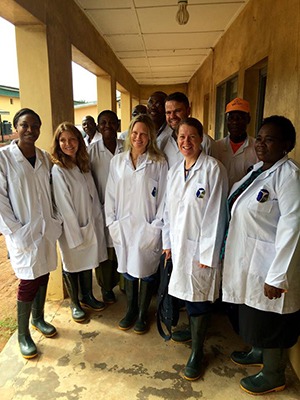 Deciding she wanted to move beyond medical emergency relief, Smith left MSF and went to work for IRC where she has been for the last thirteen years. She has held a variety of roles and worked in various countries, including Sudan, Congo, Philippines, Nigeria and Iraq. She has also done advocacy and policy work for IRC in Washington, D.C.
Deciding she wanted to move beyond medical emergency relief, Smith left MSF and went to work for IRC where she has been for the last thirteen years. She has held a variety of roles and worked in various countries, including Sudan, Congo, Philippines, Nigeria and Iraq. She has also done advocacy and policy work for IRC in Washington, D.C.
Smith recalls her first job with IRC being the most challenging. She was sent to reopen the organization’s Liberia offices in 2003, immediately after the peace agreement was signed. “DDR (disarmament, demobilization and reintegration) can be led by the military, but in reality it is a wholly civilian exercise,” explained Smith. “In Liberia, the military took the guns away but we had to help child soldiers reacclimate to life outside the military, and get the community to embrace them. It was really challenging work.”
Smith, who now leads the IRC team in Seattle, explained that she became drawn to the IRC’s U.S. programs because she wanted to help refugees rebuild their lives here in the states. She aims to raise the profile of IRC’s work in Seattle, which in turn will help raise funds to provide more services to resettled refugees. “It feels really natural to be working in U.S. programs,” said Smith. “I have an excellent staff, 45 percent of whom are former refugees. I feel like I hit the lottery with the Seattle office.” Smith explains that her years of working abroad in conflict countries has helped her be effective in her current role.
While Smith admits that she was often scared working in conflict areas, she feels people are often misinformed about humanitarian crises. “I am saddened because I feel like our humanity is being eroded away, and our sense of outrage is diminished by the 24-hour news cycle,” Smith explained. “You get people who would never donate to conflict survivors, but then would give to survivors of natural disasters, because they can relate. People know what it is like to see their neighbor lose everything to a natural disaster, whereas war and conflict are harder for people to wrap their head around.”
Smith, who loves living in the Pacific Northwest, does not know where life may take her next. “In this work, you have to be a marathon runner and not a sprinter. I really enjoy being with IRC, and I am happy in my new role,” said Smith. “When I feel like my energy levels are not what the job needs, or I become numb and stop seeing people as human beings, then it is time for self-reflection.”
Back to Top
Welcome New Members
Please welcome our newest Global Washington members. Take a moment to familiarize yourself with their work and consider opportunities for support and collaboration!
University of Washington International and English Language Programs
UW International and English Language Programs provide a wide variety of programs for both undergraduate and graduate students to help them improve their English language skills, prepare for further study in the United States and learn about American culture, business and other subjects. ielp.uw.edu
Back to Top
Member Events
Sept 17: The Rose International Fund for Children // A Decade of Difference
Sept 17: MED25 // MED 25 Benefit
Sept 20: RESULTS – Seattle // U.S. Poverty Free Agent Calls
Sept 21: OneWorld Now! // 2016 Global Leader Reception & Auction
Sept 22: Pangea Giving // Pangea Giving Coffee + Chat
Sept 22: Global Visionaries // Taste of Global Visionaries
Sept 28: American Red Cross // 2016 South Puget Sound Heroes Luncheon
Oct 4: Pangea Giving // The Fight Against Climate Change and Land Rights in Latin America
Oct 6: Shoreline Community College // The Iranian Nuclear Deal
Oct 8: Spreeha // Journey of Hope Fundraiser
Oct 13: Global Partnerships // 14th Annual World of Opportunity Luncheon
Back to Top
Career Center
ICM Caseworker, International Rescue Committee
Grant Writer/Project Manager, PotaVida
Director of Development: Institutional and Principle Giving, World Justice Project
For more jobs and resources, visit https://globalwa.org/job-board/
Back to Top
GlobalWA Events
September 14: A Global Crisis: Life in Fragile States and the Effects of Mass Migration
September 20: Bringing Down the Walls: Building Networks and Strengthening Collaborations for Greater Impact
September 22: Networking Happy Hour
September 23: Executive Director Roundtable featuring CNN Hero Razia Jan
October 12: Executive Director Roundtable featuring Rena Singer
December 8: Global Washington’s 8th Annual Conference
Back to Top
Nola’s Journey: What It’s Like to Flee Your Home
Posted on September 9, 2016.
By Katy Fairley, Medical Teams International
It’s terrifying and painful to imagine our neighborhoods and communities turning into areas where kidnappings, rapes, and looting are a constant threat. However, this scenario became a reality for Nola. Nola recounted to Medical Teams International a glimpse into what forced her to flee her home in South Sudan, “Soldiers wait outside your house leaning on a tree, and then when you go out to use the bathroom they take you away.” Nola knew her family had to escape to Uganda.
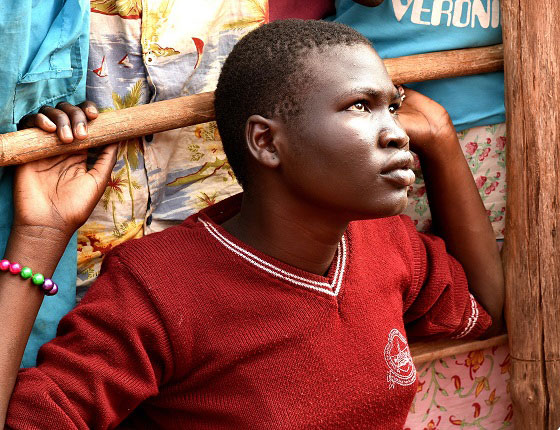
Read the full article on the Medical Teams International Blog.
Medical Teams International Appoints New CEO
Posted on September 2, 2016.
PORTLAND, Ore. – (September 2, 2016) After an extensive international search, Medical Teams International today announced the arrival of Martha Holley Newsome as their new President and CEO, replacing Jeff Pinneo who retired earlier this year.
Newsome joins Medical Teams after 20 years with World Vision International, where she led many health initiatives worldwide including serving as both the Global and Africa HIV and AIDS Director and as Health Director and National Director for World Vision Mozambique. She and her team developed a highly successful health and nutrition strategy and she has catalyzed innovation, like mobile health projects in sixteen countries. Read more (PDF)
August 2016 Newsletter
Posted on August 16, 2016.
Welcome to the August 2016 issue of the Global Washington newsletter.
IN THIS ISSUE
Letter from our Executive Director

Sustainable Development Goal 4 (SDG4) is to “ensure inclusive and equitable quality education and promote lifelong learning opportunities for all.” The stakes are high for this target, in part because reaching all of the 17 SDGs largely depends upon the success of this one goal. And achieving this goal means educating women and girls at unprecedented levels.
We know that education empowers individuals, and in turn has a transformational impact on their families, communities and our world. This month’s issue campaign takes a closer look at global education and the prominent role it plays in all other areas of global development. We’ve highlighted a number of Global Washington members who are making strides with their current education programs, and featured two in particular with unique models and inspiring roots.

As students throughout Washington state and around the U.S. get first-day jitters, and as parents hustle to get school supplies and schedules organized, I urge you to take a moment and think about students in developing countries gaining access to life-changing education for the first time. And I challenge you to think about your role in ensuring that we reach SDG4. Like so many of the issues Global Washington members tackle, this will only be conquered with a combined effort of NGOs, businesses, foundations, academic intuitions, and plenty of smart and dedicated people.
Also, this is the last week to take advantage of the early bird rate for our “Allies for Action” conference on December 8, 2016. If you haven’t yet registered, do so today. Enjoy these last few weeks of summer and I look forward to seeing you in the fall.

Kristen Dailey
Executive Director
Back to Top
Question of the Month
 Is your organization planning a social media campaign this fall? If so, please provide us with the details.
Is your organization planning a social media campaign this fall? If so, please provide us with the details.
Please click here to respond.
Back to Top
Issue Brief
Universal Education Paramount to Achieving Sustainable Development Goals
By Amanda Pain
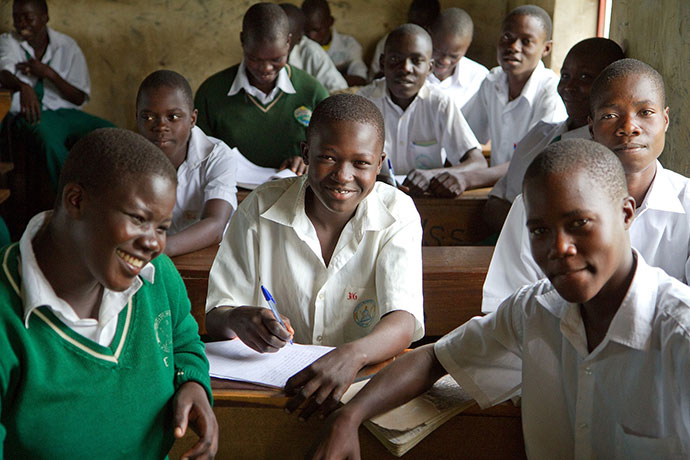 Educating people is vital to global development efforts. While there have been tremendous strides in improving access and quality of education throughout the world, 124 million children are still out of school and 757 million adults, two-thirds of whom are women, cannot read or write. The success of Millennium Development Goal 2 (MDG2), which aimed to accelerate progress in achieving universal primary education by 2015, has brought primary school enrollment up from 52 percent in 1990 to almost 91 percent in 2015. However, large disparity remains among poor and rural households and conflict-ridden areas.
Educating people is vital to global development efforts. While there have been tremendous strides in improving access and quality of education throughout the world, 124 million children are still out of school and 757 million adults, two-thirds of whom are women, cannot read or write. The success of Millennium Development Goal 2 (MDG2), which aimed to accelerate progress in achieving universal primary education by 2015, has brought primary school enrollment up from 52 percent in 1990 to almost 91 percent in 2015. However, large disparity remains among poor and rural households and conflict-ridden areas.
With increasing evidence that education can drastically improve people’s lives, Sustainable Development Goal 4 (SDG4) expands on MDG2 by promoting free primary and secondary education for all and working to eliminate gender and income inequality in education. SDG4 has ten targets, which in addition to promoting free education and equality, also focus on education quality, teacher quality and student performance. If all students in low-income countries were to develop basic reading skills, 171 million people could be lifted out of poverty.
Success in education efforts can lead to achievements in issues addressed by other SDGs. For example, students who complete primary school are less than half as likely to contract HIV when compared to students who do not complete this level of education. And educating women can have enormous effects on family health, such as decreased stunting and nutritional disorders in children, as well as lower rates of child mortality. In fact, if all women in low and middle-income countries completed secondary school, the under-five mortality rate would fall by 49 percent. Women with six or more years of schooling are more likely to seek prenatal care, skilled birth attendants and postnatal care. They are also 60 percent more likely to immunize their children.
On average, increasing educational attainment of a country by just one year leads to growth in Gross Domestic Product (GDP) per capita of 2 to 2.5 percent. On the individual level, each additional year of education a child receives increases, on average, his or her income as an adult by 10 percent. And no country has ever achieved continuous economic growth without a minimum national literacy rate of 40 percent.
Currently in sub-Saharan Africa and South and West Asia, 2.9 million girls are married by the age of 15. If all girls received secondary education, it is estimated that child marriage would fall by 64 percent and early births (before the age of 17) would fall by 59 percent. And it should be noted that risk of war and conflict is highest in areas where educational enrollment of males is low and youth population is high.
The United Nations Educational, Scientific and Cultural Organization (UNESCO) created Education for Sustainable Development (ESD) to help countries incorporate issues such as climate change, biodiversity in agriculture, disaster risk reduction and clean water and improved sanitation into their educational curriculums. The goal of ESD is to develop global citizens who are ready to confront the challenges facing our world.
With universal education playing such a vital role in achieving all of the SDGs, investment in education is crucial. At present, according to UNESCO, there is an annual financing gap of $39 billion that is needed to achieve SDG4. In order to meet SDG4 targets by 2030, spending per student in low-income countries will need to increase from $70 to $197, government spending will need to increase by 50 percent as a share of GDP, and international aid will need to increase six times the current amount. In addition to the financial challenges of achieving SDG4, other barriers include: lack of classroom space, war and conflict, gender discrimination, child labor, shortage of trained teachers, scarcity of learning materials, outdated curriculums and ineffective methods for measuring student performance.
With all of these challenges, it is important for organizations to constantly evaluate and improve their strategies, and work together in smart and efficient ways to make achieving SDG4 a reality. Several Global Washington members are on the front lines of the fight for universal education.
Ashesi University Foundation
Ashesi is a private, non-profit liberal arts university located in Ghana, West Africa. The mission of the university is to educate a new generation of ethical and entrepreneurial leaders in Africa while cultivating within its students the critical thinking skills, concern for others and courage it will take to transform their continent. Founded in 2002 by Ghanaian Patrick Awauh, Ashesi offers four-year bachelors program grounded in a liberal arts core curriculum, featuring majors in Computer Science, Business Administration, Management Information Systems, and Mechanical, Computer and Electronic & Electrical Engineering. With an academic program designed in collaboration with some of the world’s best universities, and in partnership with local and multinational employers across Ghana, Ashesi has pioneered an educational experience like no other in Africa. Ashesi plans to broaden its impact by growing to 1,000 students by 2020 and adding new programs, while maintaining their strong culture of ethics and critical thinking. Ashesi is seeking partners to continue to expand their impact in Africa.
Bo M. Karlsson Foundation
Founded in 2004, the Bo M. Karlsson Foundation (BMKF) awards higher education scholarships to underprivileged women in Nepal, empowering them to become confident, self-reliant, vital citizens in their communities and country. Over the past decade, BMKF has awarded scholarships to 45 young women who have gone on to pursue careers in accounting, business management, engineering, journalism, law, medicine, nursing, public health, rural development, social work and teaching — futures that were hopelessly out of reach before receiving scholarships to pursue their undergraduate degrees. As the majority of BMKF scholars come from remote villages, most of them are the first in their families to receive any education. Several scholars have a physical disability, belong to marginalized castes or ethnic groups, or have experienced harrowing civil war and human trafficking situations. All share a passion for education. BMKF is committed to helping them succeed.
Lift Up Africa
Lift Up Africa (LUA) has over 17 projects that provide for education in East and Southern Africa. LUA supports grassroots schools and community organizations in order to boost the good work that local people have initiated within their communities. Girls who escape early forced marriage, children with disabilities, orphans and children in poverty are some of the most vulnerable groups LUA projects help through education and other services. LUA takes a holistic approach to the education of these children which is why, whenever possible, projects incorporate feeding programs, medical services and counseling.
Mission Africa
Mission Africa believes that education is the key to ending generational poverty and that investment in education can have a profound impact on communities. Many African countries do not offer free education and Mission Africa is dedicated to ensuring that all children regardless of their income level have access to quality education. In the past ten years, Mission Africa’s academic scholarship program has awarded 795 scholarships and has allowed more than 300 students in rural villages in Nigeria, Tanzania, Kenya, Sierra Leone, Togo, Rwanda and Uganda to graduate high school and continue on to college or vocational training. Mission Africa has also shipped 10 40-foot containers filled with books and school supplies to children and families in Nigeria, Kenya and Tanzania.
Mona Foundation
Since its founding in 1999, Mona Foundation has had a simple but compelling goal — to support grassroots education initiatives that build stronger and sustainable communities by raising the status of women and girls. Mona achieves this by partnering with local leaders and investing in the education of children and youth. Mona selects initiatives that are initiated and implemented by the local community and have a proven record of success. A long-term partnership strengthens the organizational capacity of each partner, which often leads to an increase in reach, greater efficacy of programs, and an expanded ability to address complex problems. Mona partners with organizations that work to reduce the barriers to education, improve quality of learning and cultivate agency among girls and boys. Programs use an integrated approach to develop academic skills, character and engaged citizenship. As a result, young people gain competency, agency, integrity and a commitment to building socially just communities. Mona Foundation has awarded more than $8 million to 35 initiatives in 18 countries. In 2016, Mona is supporting 18 initiatives in Panama, Brazil, Haiti, India, China, Vietnam, Mongolia, Haiti and the U.S.
NPH USA
NPH USA supports Nuestros Pequeños Hermanos (Spanish for “Our Little Brothers and Sisters”) which is raising more than 3,400 orphaned, abandoned and disadvantaged boys and girls in Bolivia, the Dominican Republic, El Salvador, Guatemala, Haiti, Honduras, Mexico, Nicaragua and Peru. NPH believes that a quality education is the key to a better life. Many children arrive at NPH with little or no formal schooling. Each child is given a strong foundation of basic academic and interpersonal skills and provided with an extensive variety of educational opportunities. Nearly all of NPH homes feature on-site schools from Montessori preschool through middle or high school, as well as vocational trade certification courses. In 2015, NPH supported 369 students in university – the most in the organization’s history. Children grow up to become accountants, carpenters, doctors, farmers, mechanic, nurses, teachers and community leaders. An additional 2,100 children who live in low income areas outside the homes receive scholarships to attend NPH schools. Click here to see stories of nine children who are learning in different ways at NPH.
Rwanda Girls Initiative
Rwanda Girls Initiative’s mission is to educate and empower girls in Rwanda to reach their highest potential. The organization’s vision is for students to graduate as inspired young leaders, filled with confidence, a love of learning and a sense of economic empowerment to strengthen their communities and foster Rwanda’s growth. The Gashora Girls Academy of Science and Technology (GGAST) is an innovative and socio-economically diverse model upper-secondary school designed to provide a “whole girl” education. GGAST provides a rigorous college prep academic program, combined with leadership training and extra-curricular activities that fills girls with confidence so they can pursue their dreams of university education and impactful vocations. Since opening GGAST’s doors in January 2011, Rwanda Girls Initiative has educated 270 girls each year with a 93 percent matriculation rate to universities in 16 countries, including 80 in the U.S. and Canada with $20 million in scholarships.
Sahar Education International
Sahar provides access to education in Afghanistan and supports an educated future for Afghan girls, enabling them to actively participate in social, political and economic arenas in their communities. Sahar builds schools, computer centers and teacher training programs utilizing local labor and community support. Since 2009, Sahar has invested over $2 million in building, repairing and supplying schools in Afghanistan, a country in which 45 percent of schools operate without adequate buildings. Sahar operates 13 schools, 9 rural and 4 urban, and 87 classrooms have been built or renovated. Sahar impacts 18,000 girls annually and serves girls from Uzbek, Tajik, Pashto and Hazar ethnic groups. In total, Sahar’s programs have impacted more than 200,000 girls.
The Rose International Fund for Children
The Rose International Fund for Children (TRIFC) is transforming education for blind students in Nepal. Being a blind or visually-impaired student in a developing country is an incredible challenge. There are no areas of these student’s educational and personal needs that are properly covered with the limited funding provided by the Nepal government. Add to that the societal stigma attached to having a disability, where one is considered to be cursed or suffering from a past-life sin and the result is a neglected, marginalized group with a devastating loss of human potential. TRIFC is working to solve this problem through an innovative, holistic program which addresses all areas of need and provides students with the necessary tools to be successful in school and in life. TRIFC is working to enhance personal and educational support in the areas of health, hygiene, nutrition, school tools for the blind, daily-living skills and more.
Back to Top
Featured Organization
buildOn
By Amanda Pain
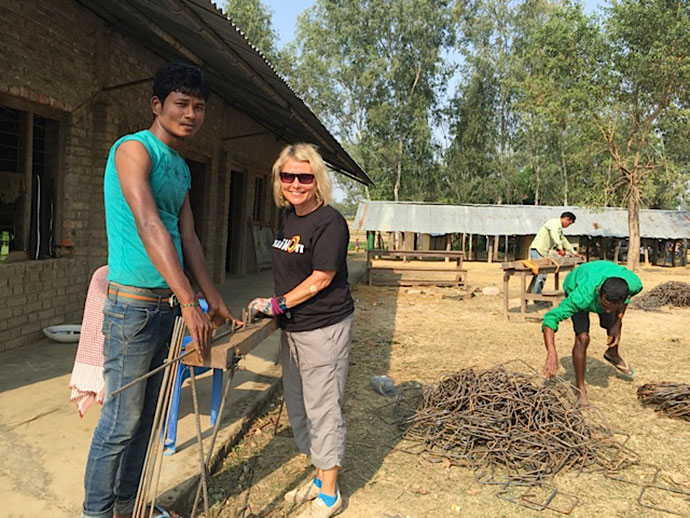 There is an education crisis, both in the United States and abroad. buildOn has been striving to solve this crises since Jim Ziolkowski founded the Connecticut-based nonprofit in 1991. The organization works to break the cycle of poverty, illiteracy and low expectations by engaging U.S. students in community service, and by building schools in the developing world.
There is an education crisis, both in the United States and abroad. buildOn has been striving to solve this crises since Jim Ziolkowski founded the Connecticut-based nonprofit in 1991. The organization works to break the cycle of poverty, illiteracy and low expectations by engaging U.S. students in community service, and by building schools in the developing world.
Randi Hedin, a buildOn board member and president of its Seattle Chapter, has been involved with the organization since 2000. “The organization’s mission around service and education is an important one for me personally and for my family,” Hedin explained. “Education is a critical issue nationally and globally, and the work of buildOn really resonates with me.” To date, buildOn has built nearly 1,000 schools in seven countries (Burkina Faso, Haiti, Malawi, Mali, Nepal, Nicaragua and Senegal).
In order to build a school, a three-way partnership must be established between buildOn, the local community and the country’s Ministry of Education. “We have about a six month vetting process of a community before we break ground on a new school,” said Hedin. “We are not just going into a village, building a school and leaving. The community and the Ministry of Education also must be committed.”
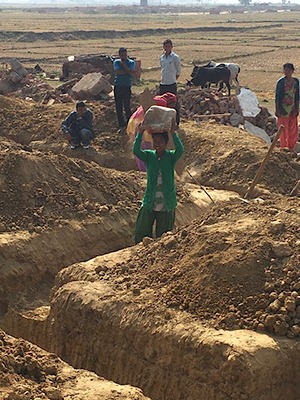 While buildOn provides communities with funding, certain building materials, skilled labor, and project supervision, it’s the local people who build each school and are responsible for its long-term maintenance. In fact, among the communities where buildOn works, nearly 1.5 million volunteer work days have been contributed by community members. The Ministry of Education supplies the resources for each school, i.e. teachers, curriculum and books. Hedin believes this methodology is key to buildOn’s success. “Our methodology is our biggest strength,” she said. “Our partnerships with the communities and ministries is what helps us build sustainable schools, and that is what this is all about — sustainability.”
While buildOn provides communities with funding, certain building materials, skilled labor, and project supervision, it’s the local people who build each school and are responsible for its long-term maintenance. In fact, among the communities where buildOn works, nearly 1.5 million volunteer work days have been contributed by community members. The Ministry of Education supplies the resources for each school, i.e. teachers, curriculum and books. Hedin believes this methodology is key to buildOn’s success. “Our methodology is our biggest strength,” she said. “Our partnerships with the communities and ministries is what helps us build sustainable schools, and that is what this is all about — sustainability.”
After assessing country need and local support, buildOn chooses a community for a school. “One of the measures that buildOn uses to choose a country is the Human Development Index (HDI), but you also need a stable country and buy-in from the government in order to be successful,” explained Hedin. The commitment by each partner is solidified with the signing of a buildOn covenant, which occurs before the groundbreaking of every school. This covenant, signed by a ministry representative, the entire community as well as buildOn staff and donors, is a promise by each partner to fulfill their role in building and maintaining the school.
Communities are also required to establish a leadership committee with an equal number of men and women from the village who oversee the school’s construction and ensure the community is adhering to covenant requirements. Communities must send an equal number of girls and boys to each buildOn school and the organization monitors all of their schools for three years to ensure that the school is maintained and used for its intended purpose, and that it is educating girls as well as boys. To date, 49 percent of students attending buildOn schools are girls.
“The signing of the covenant is amazing to see,” said Hedin. “To be there on the day of the groundbreaking and watch everyone sign, or leave their fingerprint if they are illiterate, is a very powerful experience.” To Hedin’s knowledge, no community has ever broken a covenant agreement. In fact, an audit conducted after the organization built its 500th school showed that only two schools were no longer being used, and both cases were due to the effects of natural disasters.
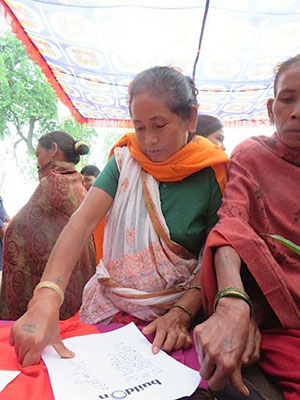 buildOn is doing more than educating children. In 1998, the organization started an adult literacy program in five countries, and it will soon expand to a sixth. Evening classes are held at buildOn schools and provide adults with basic literacy and numeracy skills. According to Hedin, nearly 70 percent of the adults who participate in these classes are women. “It is incredible to see these women attending classes because they have very long days, and so much responsibility,” she said. To date, over 120,000 children, parents and grandparents are attending buildOn schools.
buildOn is doing more than educating children. In 1998, the organization started an adult literacy program in five countries, and it will soon expand to a sixth. Evening classes are held at buildOn schools and provide adults with basic literacy and numeracy skills. According to Hedin, nearly 70 percent of the adults who participate in these classes are women. “It is incredible to see these women attending classes because they have very long days, and so much responsibility,” she said. To date, over 120,000 children, parents and grandparents are attending buildOn schools.
Hedin explained that one challenge buildOn regularly faces is making families understand the value of education and how much it can benefit their community. “There is still a lot of educating to be done around the world about the value of education, and we shouldn’t take that for granted,” she said. “I have always viewed education as something that helps lay the foundation for global development. Without it, it is hard for families to rise out of poverty.”
Over the next five years, buildOn hopes to go deeper into some of the communities where it works, and ultimately have a greater impact on the people who live there. “When I travel and talk to families that have sent their children to a buildOn school, you see that everyone has the same desires for their kids,” Hedin said. “All parents want their children to have a better future, and it’s terrific that buildOn partnerships are bringing people together.”
The Seattle Chapter of buildOn is hosting a dinner on Thursday, December 1st, 2016 at the Seattle Marriott Redmond to raise money for building schools in Mali. For more information, contact Jacquelyn Horstmann, National Event Manager, at Jacquelyn.horstmann@buildon.org or 203-585-5391. For more information about the Seattle Chapter, contact Randi Hedin at randi.hedin@gmail.com or 425-233-7162.
Back to Top
Changemakers
Calvin Echodu, Founder and Board Vice-Chair, and Dorothy Echodu, Chief Executive Officer, Pilgrim Africa
By Amanda Pain
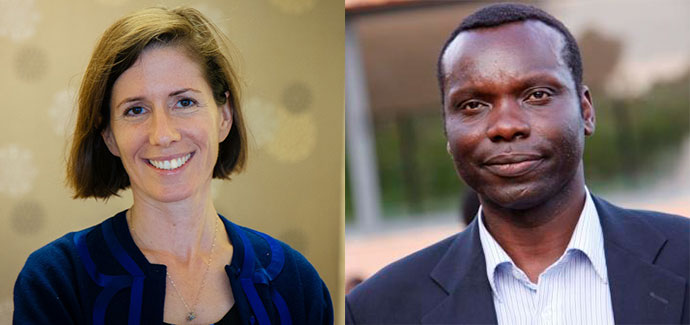 “A pilgrim is someone who knows where he or she is going. Someone who is headed somewhere. The destination makes the pilgrim.” Dorothy Echodu, CEO of Pilgrim Africa, an NGO with offices in Seattle and Uganda, uses this to explain her organization’s mission. Since Calvin Echodu, Dorothy’s husband, founded Pilgrim Africa in 2001 as a small, grassroots organization providing refugee assistance, it has evolved to focus on global education and malaria eradication. This evolution is a credit to Mr. and Dr. Echodu; they are pilgrims.
“A pilgrim is someone who knows where he or she is going. Someone who is headed somewhere. The destination makes the pilgrim.” Dorothy Echodu, CEO of Pilgrim Africa, an NGO with offices in Seattle and Uganda, uses this to explain her organization’s mission. Since Calvin Echodu, Dorothy’s husband, founded Pilgrim Africa in 2001 as a small, grassroots organization providing refugee assistance, it has evolved to focus on global education and malaria eradication. This evolution is a credit to Mr. and Dr. Echodu; they are pilgrims.
In 1996, the Ugandan government moved citizens into government-run camps in order to protect them from the Lord’s Resistance Army (LRA). These camps were dangerous and rife with disease and those displaced were living in squalid conditions. It was close to impossible for NGOs to get into the camps because of the war between the LRA and the government. Calvin Echodu felt a call to help.
“My vision for starting the organization was to restore hope and try to address the plight of displaced people,” Calvin said in regards to witnessing the conditions of nearly 1.7 million people living in poverty and disease. So he did what no one else could do at the time — he took resources to those living in the camps. “Getting resources to the camps took ignoring security and safety warnings, and driving through roads that were unsafe to travel,” said Calvin. Today, he continues to serve on the board of Pilgrim Africa, while also in the role of CEO of Earthwise Ferries Uganda Limited, a Ugandan based company that is helping to restore economic growth in East Africa by connecting cities through waterways.
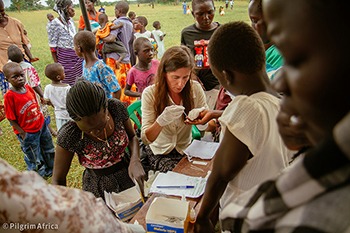 “I think it is fair to say Pilgrim Africa restored hope to the hopeless when it was able to deliver lifesaving medicines to families in the camps; when it resettled families giving them the ability to restart their lives after years in the camps; when it provided an educational opportunity to children with no hope of getting secondary education; and when it energized the community and government to defeat malaria,” said Calvin. “All of these things give the community hope.”
“I think it is fair to say Pilgrim Africa restored hope to the hopeless when it was able to deliver lifesaving medicines to families in the camps; when it resettled families giving them the ability to restart their lives after years in the camps; when it provided an educational opportunity to children with no hope of getting secondary education; and when it energized the community and government to defeat malaria,” said Calvin. “All of these things give the community hope.”
“I knew about Calvin and his work with refugees before we met,” said Dorothy Echodu. “I was enormously impressed by his courage.” The two met in Olympia when Calvin came to the U.S. to study trauma counseling. At the time, Pilgrim Africa was working toward founding Beacon of Hope School, a secondary school created for former LRA child soldiers who were forced to fight, and orphaned during the war. “At first, Pilgrim Africa tried to re-integrate these shell-shocked, severely traumatized abductees into their families after short courses with trained trauma counselors,” said Dorothy. Beacon of Hope School opened in 2006 to create a safe environment for children to live and rehabilitate. “We started the school to meet the educational and counseling needs of this special population, and we never looked back.”
Dorothy was no stranger to working with disadvantaged populations. Before graduate school she worked for Values Project Northwest, an NGO in Washington state that conducts workshops between Native American tribes and companies in conflict over natural resources. She believes working there gave her a lifelong appreciation for indigenous efforts. She also feels strongly that her education has helped prepare her for the role as CEO. As an undergraduate at Yale she studied literature, which she feels has helped her with cross-cultural communication. And she said her graduate studies have taught her how to solve complex problems. “The common theme in both my studies of the sciences and of the humanities was an appreciation for rigor,” she said. “I’d like to impart that appreciation to others.”
Today as CEO, Dorothy has helped expand the focus of Pilgrim Africa’s global education program. Beacon of Hope School, while initially for LRA abductees, today educates nearly 700 students, almost 400 of whom are on a full scholarship. Applicants are accessed on merit and need, with an emphasis on educating students from rural areas with little access to secondary education. Students go on to attend college, and continue into a range of professions from doctors to engineers. “I am passionate about education in part because I’ve been so extremely fortunate in having a broad and excellent one,” said Dorothy. “I had the fortune of being exposed to very wonderful teachers and stimulating instruction, and I very much want others to have the same opportunity.”
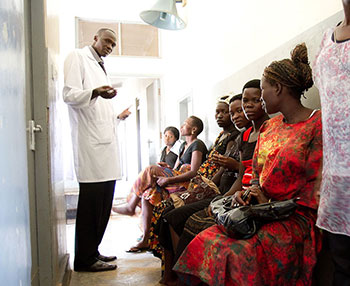 Dorothy also leads Pilgrim Africa’s malaria eradication work. In 2007, Uganda experienced severe flooding and Pilgrim Africa feared malaria would become a huge problem. “That was the beginning of our work in malaria and since then we have gotten incredible passionate about it,” she said. “We really feel malaria is holding the nation hostage and yet it is fully treatable and preventable.” In May 2016, Pilgrim Africa received a $2.49 million grant from the Bill and Melinda Gates Foundation to continue its innovative malaria eradication efforts.
Dorothy also leads Pilgrim Africa’s malaria eradication work. In 2007, Uganda experienced severe flooding and Pilgrim Africa feared malaria would become a huge problem. “That was the beginning of our work in malaria and since then we have gotten incredible passionate about it,” she said. “We really feel malaria is holding the nation hostage and yet it is fully treatable and preventable.” In May 2016, Pilgrim Africa received a $2.49 million grant from the Bill and Melinda Gates Foundation to continue its innovative malaria eradication efforts.
As part of the board, Calvin is working on developing Pilgrim Africa’s strategic plan and he hopes the organization he founded will to continue to evolve. They want to add innovative courses to Beacon of Hope School’s curriculum, such as robotics, computer science and welding to give students job-based skills, and want to eventually turn these courses into a Center of Innovation and Excellence to help respond to the emerging needs of the community. Pilgrim Africa’s leaders also dream of opening a university in Teso, Uganda, as well as starting secondary schools in places like South Sudan and Democratic Republic of the Congo, regions affected by conflict and war.
From the initial vision to help bring hope to people in refugee camps, to the current work expanding global education and malaria eradication programs, Pilgrim Africa continues to deliver hope. And the Echodus are the pilgrims leading the way. “Overall, while I am CEO, I would like to see God glorified in the work of Pilgrim Africa,” said Dorothy Echodu. “For me that means we need to be bold and to risk ourselves to try and bring about something wonderful.”
Back to Top
Welcome New Members
Please welcome our newest Global Washington members. Take a moment to familiarize yourself with their work and consider opportunities for support and collaboration!
Boost! Collective
Boost! Collective is a story-driven boutique communications firm. They can help you discover, write and tell the powerful human stories that engage your audiences and drive deep and meaningful engagement. www.boostcollective.com
SIGN Fracture Care International
SIGN builds orthopedic capacity in developing countries. They partner with surgeons to provide orthopedic training and surgical implants for free or at minimal cost so that surgeons can provide swift and effective care to the injured poor. signfracturecare.org
Back to Top
Member Events
Aug 28: Water1st International // Bike for Water – Seattle
Sep 8: Trade Development Alliance // Global Cookout
Sep 15: Medical Teams International // Annual Volunteer Appreciation Gathering
Sept 22: Pangea Giving // Coffee + Chat
Back to Top
Career Center
Highlighted Positions
Development Director: VillageReach
Foundations Officer: Landesa
Program Coordinator: Splash
For more jobs and resources, visit https://globalwa.org/job-board/
Back to Top
GlobalWA Events
August 18: Networking Happy Hour
September 20: Bringing Down the Walls
December 8: Global Washington’s 8th Annual Conference
Back to Top
YPIN Global Cafe: Social Media and Global Relations
Posted on August 2, 2016.
By Amanda Clark
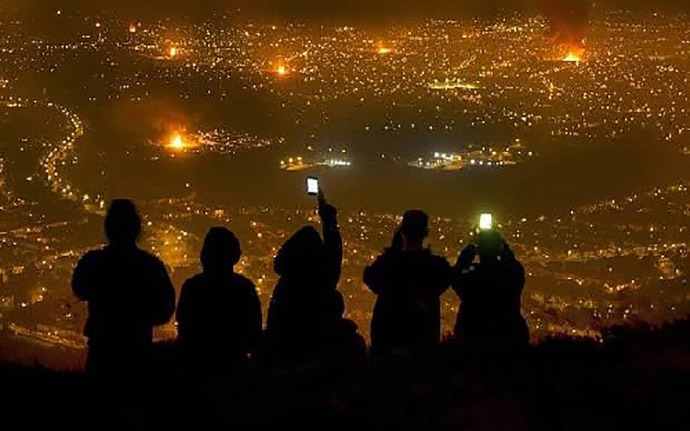
On Tuesday, July 26 at Rendezvous in Belltown, young professionals gathered to discuss the impact of social media in their lives as well as its impact on global relations. Attendees wrestled with questions of how social media is affecting media, politics and security, with a few lighter moments touching on Pokémon Go and Tinder. The discussion was part of YPIN’s Global Cafe Series. YPIN is the World Affairs Council’s Young Professionals International Network and its Global Cafe Series was created to engage participants in critical discussions about today’s leading global challenges.
Continue Reading
24 Financial Ventures Changing the World Through Social Impact Investing
By Grant Trahant, Founder at Causeartist
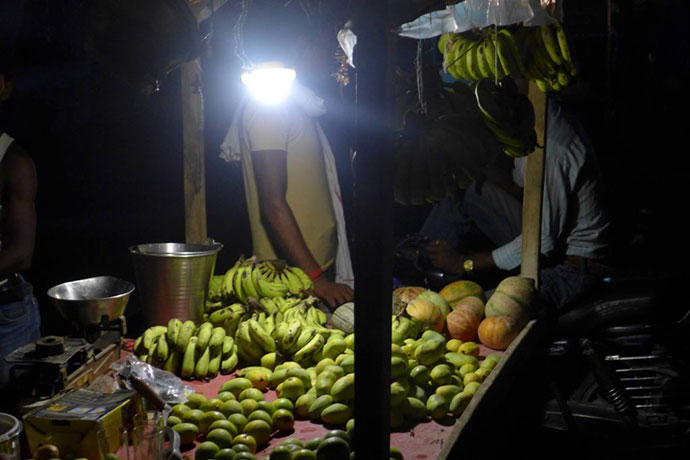
The world of social impact investing is expanding rapidly. In 2012 the Forum for Sustainable and Responsible Investment reported $3.31 trillion in US assets held by 443 institutional investors and 272 money managers. In addition,1,043 community investment institutions applied ESG standards into their investment portfolios. One of the most interesting parts about social impact investing is the returns investors are seeing. A 2015 Report by Morgan Stanley indicated that sustainable investing funds have actually met or exceeded the median returns of traditional equity funds. The report also made an excellent point about volatility. The report states that 72 percent of the companies surveyed with a social impact purpose showed higher profitability and lower volatility. This is important to note, because where there is low volatility and growth in a certain sector, big sums of money tend to pour in.
Click here to read the full article in Causeartist.
Navigating the Jungle Gym of a Career in International Development
By Annelise Matsuo, Membership & Events Intern, Global Washington
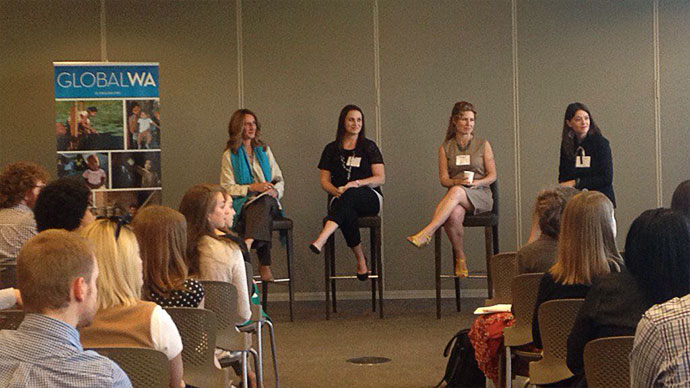
On July 20, 2016, Global Washington partnered with Landesa to lead a panel discussion on careers in international development, hosted at the PATH headquarters in Seattle. The discussion was moderated by Global Washington’s Executive Director, Kristen Dailey, and included Radha Friedman, Michele Frix, and Rebecca Okelo, three young professionals who have already made significant contributions to the vibrant international development community in Washington state. Friedman currently serves as Director of Programs at World Justice Project, Michele Frix is Chief of Staff at the Seattle Foundation, and Rebecca Okelo is founder and Executive Director of MED25 International.
Continue Reading
July 2016 Newsletter
Welcome to the July 2016 issue of the Global Washington newsletter.
IN THIS ISSUE
Letter from our Executive Director
 It was 1994 and I was in the Dominican Republic when I got caught in a torrential downpour. The dirt, mountain road I was on became completely washed out to the point where my car could not go any further. I was stranded. Two incredibly generous Haitians invited me into their small shelter to wait out the storm. Their home had no electricity, a leaky roof, and it was the only structure within miles. These are the people that are all too often left out of international development programs because they are so hard to reach on the “last mile” of the road.
It was 1994 and I was in the Dominican Republic when I got caught in a torrential downpour. The dirt, mountain road I was on became completely washed out to the point where my car could not go any further. I was stranded. Two incredibly generous Haitians invited me into their small shelter to wait out the storm. Their home had no electricity, a leaky roof, and it was the only structure within miles. These are the people that are all too often left out of international development programs because they are so hard to reach on the “last mile” of the road.
Several Global Washington members are specifically working to improve the lives of those living in remote areas and they’re highlighted in the issue brief below. Two unique models are also featured this month — World Bicycle Relief that is increasing mobility and connectivity for people in rural areas, and VillageReach whose tagline is “Starting at the Last Mile.” These organizations are truly an inspiration to me.
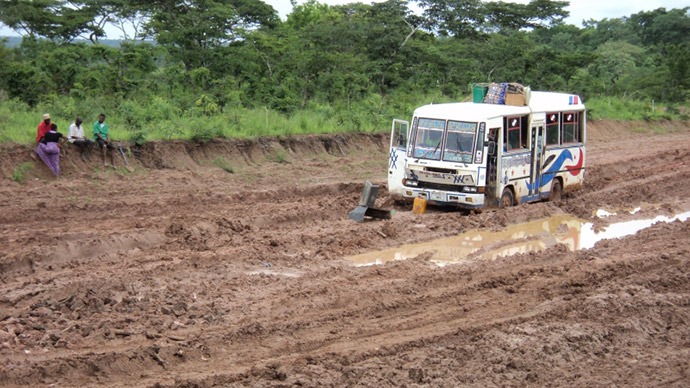
I hope you enjoy these summer months and take time to reflect and recharge. In the fall, Global Washington will spotlight the issues of global education, mass migration and fragile states, and financial inclusion. In the meantime, I hope to see you at one of our upcoming events.

Kristen Dailey
Executive Director
Back to Top
Question of the Month
 What are you most looking forward to at this year’s GlobalWA Conference? In addition to the regular features, are there any topics or speakers that you would like to see included?
What are you most looking forward to at this year’s GlobalWA Conference? In addition to the regular features, are there any topics or speakers that you would like to see included?
Please click here to respond.
Back to Top
Issue Brief
Reaching the Last Mile: Challenges and Opportunities
By Amanda Pain
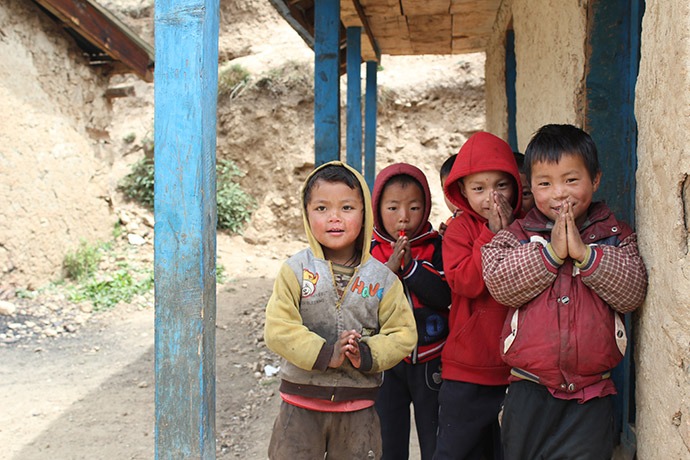
Adara Development
The 2014 Ebola outbreak in West Africa amounted to over 27,000 infections and 11,000 deaths, costing billions of dollars in economic loss and international aid spending. This crisis was traced back to a single two-year-old boy living in rural Guinea, a part of our world where services, such as healthcare, are extremely hard to deliver. We call this part of the world the last mile.
In economic terms, the last mile is the final leg in point of service delivery or retail sale. In international development terms, reaching the last mile, or rural, often isolated communities, involves reaching villages without paved roads, with little access to communication and poor infrastructure. Without services flowing in and out of these areas, people are disconnected from valuable products and often left in a perpetual state of poverty.
Seventy-five percent of the world’s poor live in rural areas with insufficient access to education, healthcare, clean water and sanitation. The percent of children not in school in rural areas is twice as high as in urban areas, and children in rural areas are 1.7 times more likely to die before their fifth birthday in comparison to urban areas. Nearly half of those living in rural areas lack improved sanitation facilities, and one in four practice open defecation. Investment in rural areas has been slow with policies often catering to the urban poor. Agricultural investment, which many rural families depend on, has been stagnant or declining for the past three decades. According to the Food and Agriculture Organization of the United Nations (FAO), an additional 50 percent in annual investment is needed to eradicate huger and increase food production by 2050.
Part of the difficulty in reaching the last mile, in addition to the human and financial constraints and lack of infrastructure, is that interventions and services are not designed or equipped to reach these unique environments. In order for last mile solutions to be sustainable, they must address challenges specific to low-resource settings. While countries have policies to define how the supply chain should operate, a lack of resources can make the process on paper inconsistent with reality. Supply chain logistics might not be a popular cause for donors, but investment in it is crucial.
A number of organizations focus on using technology to bring services to those living in last mile regions. VillageReach uses information and communication technology specifically designed for low-resource environments to optimize data collection, improve data visualization and improve communication to ensure quality healthcare delivery. World Vision’s Last Mile Mobile Solutions were designed to streamline and improve upon aid delivery, whereby information can be exchanged wirelessly without the need for mobile phone networks, Internet connectivity or electricity. And World Concern, working with Seattle start-up ScanMyList, created a mobile app to streamline the process of tracking food distributed to poor rural families, as well as payments to local merchants in drought stricken areas in the Horn of Africa.
In addition to NGOs innovating new technologies to reach the last mile, public-private partnerships are also helping in this endeavor. Melinda Gates questioned why, if Coca-Cola can reach remote areas of the world, vaccines, medicines and other necessary services can’t also reach these places. This prompted the launch of Project Last Mile in 2010, a collaboration between The Coca-Cola Company, The Coco-Cola Africa Foundation, The Global Fund, United States Agency for International Development and the Bill and Melinda Gates Foundation. In 2014, the partners announced they would invest $21 million, as well as in-kind resources, in order to deliver needed health services to ten African countries by 2020.
The consequences of not reaching the last mile affect everyone. When products and services cannot reach remote areas of the world, local and global economies are affected. When education services, food and improved sanitation cannot reach people everywhere, global development progress is slowed. And when needed health services cannot reach people living in the last mile, 11,000 people may die unnecessarily from disease outbreak. Below are several Global Washington members who focus their work on reaching the last mile.
Adara Development
Adara Development was established out of a passion to deliver essential services to people living in extreme poverty in extremely remote locations. That passion took Adara to the Humla District of Nepal, a community of more than 50,000 people who live high in the Himalayas with limited access to government and other services. They have some of the nation’s lowest literacy rates, their maternal and infant mortality is well above the national average, their sanitation is inadequate, and they run short of food each winter when families are sometimes snowed in for months. To address these challenges, and at the request of the community, Adara focused interventions in two main areas: community health and education. Humlis are now more often sending their children to school, trafficking has been almost eliminated from the district, complaints of respiratory and diarrheal disease have decreased, and families now have access to health services through the provision of health and roaming medical camps.
Agros International
Even in poor Central American countries, the urban underclass accesses services, infrastructure and economic opportunities that the rural poor only dream of. Robbed of security, stability and hope, generationally illiterate rural families are forced to migrate for menial labor and raise children without sanitation, education or healthcare access. Here in these “last mile” communities, Agros International offers families the opportunity to rebuild the social, economic and civic systems that characterize dignified life. For 34 years, Agros has been going deep and prioritizing impact, giving rural poor families the chance to own land, plug into health and education systems, develop profitable, market-led agricultural businesses and establish community organizations. Eventually, as families pay off a land loan financed by Agros and reach milestones on Agros’ Path to Prosperity development framework, their communities transition to sustainable self-governance. Agros’s mission is to provide a fair opportunity for families to reach their God-given potential and permanently break the cycle of rural poverty.
Awamaki
Awamaki is a nonprofit social enterprise that empowers rural Andean women with skills training, connects them to global market opportunities and enables them to earn an income to transform their communities. Awamaki strives to teach women’s cooperatives to start and run their own businesses through its programs in fair trade artisanal crafts and sustainable tourism. With the help of Awamaki staff and volunteers, Andean women are able to sell their products to international retailers of ethically-sourced handmade goods, connect with global volunteers who make a difference, and welcome tourists into their culture. Awamaki envisions these highly-skilled Andean women artisans from remote communities engaged in the market economy, running successful cooperative businesses and leading their communities out of poverty.
Construction for Change
Because buildings can transform lives, Construction for Change (CfC) provides construction management to under-resourced communities that have identified the need for a building to house their critical work. They do this through partnerships with nonprofits, by leveraging a vast networks of volunteers, tapping into resources and expertise, and transferring industry standards and best practices. An organization’s ability to make an impact in their community is directly affected by the infrastructure they have at their disposal. Here’s why: global populations are increasing at exponential rates and new infrastructure is required to keep up with growing demand for education, healthcare and social services; current infrastructure in last mile communities is often unsafe and insufficient, if it exists at all; and government budgets, the traditional source of funding for CfC infrastructural projects, has dramatically decreased in recent years, leaving a significant gap in resources. Together with global partner communities, CfC is building towards the end of the last mile to establish a just and equitable society for all.
Guatemala Village Health
Guided by the United Nations Millennium Development Goals, Guatemala Village Health (GVH) develops and implements programs that involve communities and their leaders in moving toward a healthier life. The organization’s work is focused on three key areas: education, health and economic development. Within education, GVH provides students with basic health and nutrition information, as well as offers scholarships for continued learning; it trains midwives and provides birth kits for healthy deliveries; and it provides residency training opportunities for U.S. doctors in rural Guatemala. Within healthcare, GVH is working to improve childhood health and nutrition, maternal health, midwifery, preventive dentistry, sanitation, and chronic disease treatment. And finally, GVH is providing microfinance support for an artisan textile project.
Literacy Bridge
Over 750 million adults are illiterate, and 1.4 billon people live without electricity. Illiteracy and lack of access to knowledge inhibit socioeconomic development and equity in remote and rural areas. Literacy Bridge aims to significantly improve the health, income and quality of life for the world’s most underserved communities by providing life-changing knowledge through innovative technology. Literacy Bridge provides a comprehensive program that uses an audio learning computer, the Talking Book, to deliver relevant, accessible and accurate information on health and agricultural challenges, including messages on financial services, marketing and gender issues. They leverage local expertise and existing research, recording messages in song, drama and interview formats, as well as in local languages and dialects. Through a dedication and focus on research and development, Literacy Bridge programs are a continual learning lab with carefully designed and tested feedback loops and mechanisms to ensure delivery of the latest information in a continually improving, creative learner-centered program.
Schools for Salone
Schools for Salone is a nonprofit that revitalizes Sierra Leonean communities, empowers children and improves socioeconomic conditions for families, communities and future generations. Schools for Salone improves access to and quality of education, and has built 18 schools and 3 libraries since 2005. They also train teachers at intensive summer institutes. With a proven track record of working with Sierra Leoneans as they rebuild after a ten-year civil war, the organization builds new schools within three months after funds are raised. Through opportunities that only an education can provide, Schools for Salone strives to break the cycle of poverty, one school at a time.
VillageReach
VillageReach is a global health innovator that develops, tests, implements and scales new solutions to critical health system challenges in low-resource environments, with an emphasis on strengthening the “last mile” of healthcare delivery. VillageReach improves health outcomes by extending the reach and enhancing the quality of healthcare, focusing on the most critical barriers at the last mile: lack of infrastructure, information availability, healthcare access, and human resource constraints. With more than a decade of experience studying and working in low-resource communities around the globe, VillageReach capabilities include supply chain design, software development, human resources for health, advocacy and change management, and private sector engagement. Through partnerships with governments, local communities and other non-governmental organizations, VillageReach combines expertise across public health, technology, and business to bring life-saving innovation – new systems, programs and technologies – to scale and sustainability.
World Bicycle Relief
In rural developing countries, a bicycle is a powerful tool that can connect students with education, health care workers with patients and entrepreneurs with markets. In these remote, rural areas, often the primary mode of transportation is walking and distance becomes a barrier to accessing education, health care and economic opportunities. Riding a bicycle is four times faster than walking; with the efficiency a bicycle provides, people can accomplish so much more. World Bicycle Relief provides rugged, high quality bicycles to students and health care workers through study-to own and work-to-own programs. Reliable transportation is a basic building block of any economy, big or small, and a bicycle can spark the tremendous untapped human potential in rural developing areas and mobilize millions to change their lives.
Back to Top
Featured Organization
Featured Organization: World Bicycle Relief
By Amanda Pain

World Bicycle Relief
Dave Neiswander, President of World Bicycle Relief (WBR), remembers his first trip to Zambia in 2007. As he rode in the back of a pick-up truck with WBR co-founder Leah Missbach Day, they imagined seeing bicycles along that same road connecting resources to people living in the last mile community of Palabana. Today, WBR has provided over 15,000 Buffalo Bicycles to the rural, isolated area of Palabana, and their dream has become a reality.
WBR was founded when FK Day, who also founded SRAM Corporation (a bicycle parts manufacturer), and his wife Leah wanted to find a way to reconnect people to resources after the 2004 Indian Ocean Tsunami. Approximately 24,400 bicycles were donated to people in Sri Lanka; one-third went to healthcare workers, one-third to students and one-third to entrepreneurs. “A post-evaluation done on this program showed that the bicycles made a big difference in terms of connecting people to schools, clinics and the marketplace,” Neiswander explained. World Vision, WBR’s field implementation partner in Sri Lanka, then asked WBR to help provide volunteer health workers with bicycles to reach more people living with HIV/AIDS in sub-Saharan Africa.
At that time, the bicycles available in Africa were not reliable and required frequent replacement. “We call them BSOs – bicycle shaped objects,” said Neiswander. This inspired FK Day to build a new bicycle, one that was made for the tough terrain of rural communities. As WBR continued to improve their bicycle design, which is now on its 17th generation, NGOs and local businesses began to inquire about purchasing the bikes. Thus, the social enterprise Buffalo Bicycles Ltd. was born in 2009 with the proceeds funding WBR philanthropic endeavors. During its tenure, WBR has successfully partnered with the United States Agency for International Development and the UK’s Department for International Development for programs in Zambia and Zimbabwe. WBR has also collaborated with corporate partners such as UBS, Volkswagen, Deloitte and Mondelez International, Inc.
Since its founding in 2005, WBR has delivered nearly 300,000 bicycles to 18 different countries. Today, WBR focuses on three main program areas: healthcare, education and economic development. And impact evaluations have shown program success. Buffalo Bicycles, which are designed to carry 100kg, allow people to carry five times more weight and travel four times the distance when compared to walking. Entrepreneurs using Buffalo Bicycles can increase profits by 50 percent, and healthcare workers can reach 40 percent more patients. Buffalo Bicycles have also increased student attendance by 28 percent, and increased academic performance by 59 percent (especially among girls who receive 70 percent of the bikes in WBR’s education program).

World Bicycle Relief
“When we first started the Bicycles for Educational Empowerment Program (BEEP) back in 2009, we were thinking of providing 60 percent of bicycles to girls and 40 percent to boys,” Neiswander explained. “However, the Ministry of Education came back to us and told us that 70 percent should go to girls, because research shows that magical things happen as girls stay in school.”
WBR does much more than just drop off bikes. Partnering with local and international development organizations, WBR runs programs in Zambia, Kenya, Zimbabwe and South Africa. “We want to make sure that it is not just about dropping off bicycles and leaving,” Neiswander explained. “We train field mechanics — 1,209 have been trained to date — and ensure a robust spare parts supply chain in order to make a sustainable impact.” Within the healthcare and education programs, WBR holds distribution ceremonies within the local community, whereby the healthcare workers or students publicly sign a contract for their bicycles. The contracts are two-year service-to-own or study-to-own agreements, with the understanding that they will lose their bicycle if they drop out of the program.
“I think we learned early on that it’s important to engage the community before you walk in and start delivering bicycles,” said Neiswander. “The contract puts the receiver’s skin in the game, and signing the contract in front of the community creates a social contract.” In order to ensure that the bicycles are being used appropriately, WBR works with implementing partners on the ground, such as PATH, World Vision and Plan, as well as local village leaders. Implementing partners play an important role in educating communities about the importance of girls attending school, and how that can lead to a reduction in poverty and infant mortality rates. Community leaders form a committee to choose healthcare workers or students to receive bicycles, and then ensure the bikes are being used for their intended purpose. “Sometimes people will sell their bike, or not use it for the program,” said Neiswander. “But it doesn’t happen often, and I think it’s important that it happens because it demonstrates the consequences of breaking the contract to the community.”
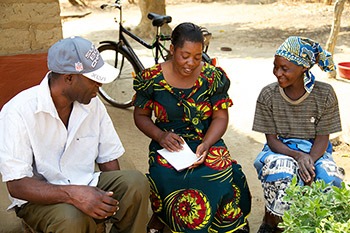
World Bicycle Relief
WBR’s economic development programs work a little differently. One example is a partnership with the Palabana Dairy Cooperative in Zambia. The program provides bicycles to dairy farmers for transporting milk from their farm to the local chilling center. The Palabana Dairy Cooperative pays WBR for the bicycles, and then the cooperative collects payment from the farmers over a three-month period. WBR has similar programs with other businesses in Zambia, Zimbabwe and Kenya, and NGOs also purchase Buffalo Bicycles for their own programs. Neiswander explained, however, that WBR does not sell bikes to everyone who asks. “I get requests every day for bicycles from all over Africa. But if we aren’t operating there, meaning we don’t have field mechanics or spare parts, that means we can’t support the bicycles, which won’t lead to sustainable impact.”
Neiswander believes WBR’s work in helping rural girls living in last mile communities access education has been empowering. “We have had situations where a girl was sold for her dowry into an early marriage, but the WBR bicycle contract was then used to keep that girl in school,” he said. “That to me has been the greatest impact of our programs.”
And what about those in the last mile gaining access to basic goods and services? “In the rural areas we are working, you could build more roads, more schools and more clinics, but that is going to take a long time,” said Neiswander. “How are you going to reach that last mile? I think the bicycle is a very effective, sustainable and environmental friendly tool to connect people to resources. We are focused on building the best bicycle we can, and designing the best programs,” he said. “We are not just a bicycle organization, we are creating mobilized communities.”
Back to Top
Changemaker
Evan Simpson, President, VillageReach
By Amanda Pain
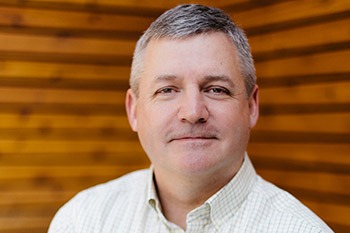 After 15 years at PATH, most recently serving as interim Country Program Director for PATH India, along with extensive education, training and a passion for global health, Evan Simpson is embarking on a new journey. As the new President of VillageReach, a post he took over earlier this month, Simpson will lead efforts to bring innovative global health solutions to the last mile.
After 15 years at PATH, most recently serving as interim Country Program Director for PATH India, along with extensive education, training and a passion for global health, Evan Simpson is embarking on a new journey. As the new President of VillageReach, a post he took over earlier this month, Simpson will lead efforts to bring innovative global health solutions to the last mile.
Accessing remote or isolated communities, often rural, to deliver needed services such as vaccines, interventions or health information is what reaching the last mile is all about. This has been the focus of VillageReach’s efforts since it was founded in 2001, and it is partly what attracted Simpson to his new position. “The global health field is changing and I think VillageReach represents the future of international non-governmental organizations (NGOs),” he said.
During his tenure at PATH, Simpson held a variety of roles starting as the organization’s first director of communications in 2001. “My job was to tell PATH’s story, which was a complicated and challenging role,” he explained. With a desire to do programmatic work and apply the training from his Master of Public Health degree from the University of Washington, Simpson left his communications role to work on Rotavirus vaccine introduction. He held a variety of positions before taking over the interim director role with PATH India. “PATH has given me so many different opportunities along the way to create programs and projects of interest to me, which is why I stayed so long,” said Simpson. “I learned a lot and had a lot of diverse experiences.” While at PATH, Simpson was accepted into the Executive Doctoral Program in Health Leadership at the University of North Carolina at Chapel Hill and will soon complete his DrPH degree.
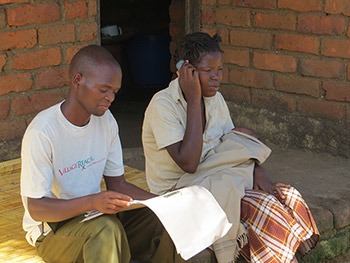
VillageReach
Simpson believes local governments around the world are looking for greater autonomy in establishing and implementing public health programs, a sentiment echoed by his team at VillageReach. He explained that while countries need technical guidance, they ultimately want to be in charge of programs themselves, a role which historically has gone to large global development organizations. “I think there is a desire for a smaller footprint, and the future of global health is moving towards smaller, more nimble NGOs providing technical assistance to local partners,” said Simpson. “When working to establish systems abroad, local governments are ultimately the ones to carry forward and sustain those systems, and the governments want to utilize local talents and build local capacity.”
Simpson feels VillageReach is now at a point where it can decide how best to grow in order to have the most impact. “We want to think carefully about how we grow and I am looking forward to working with the leadership team and the board to look at growth over the next five to ten years,” said Simpson. He believes VillageReach’s steady growth to date has allowed it to become a major player in global health while bringing to light the importance of reaching the last mile. “VillageReach has done a tremendous job in making sure that 70 or 80 percent vaccine coverage, for example, is not a job complete. I credit the organization with really pushing the last mile agenda, not just with advocacy but also with solutions.”
Simpson hopes last mile efforts will garner more attention in the future. “The big sign that the global community was not paying attention to the last mile was the Ebola crisis,” he explained. “That was a clear indicator that a segment of our world is isolated without health systems or infrastructure.” In Simpson’s opinion, reaching the last mile requires three key resources: human, financial and technical. He believes difficulty is largely due to constrained resources, particularly when there are places without trained staff, roads or infrastructure for medicine and vaccine storage. “Reaching the last mile is an objective that requires appropriate use of technology, which is an area in which VillageReach has been a real game changer.”
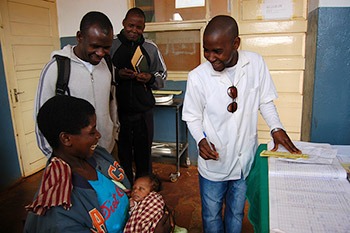
VillageReach
Simpson has learned the importance of relationships in global development work, including relationships with governments, donors, partners, communities and individuals. “If you don’t have those relationships and try to accomplish things without building them, you probably won’t succeed,” he explained. This is especially true when it comes to reaching the last mile. Simpson believes organizations have to build relationships with local institutions in order to get local buy-in. “The long term sustainability of programs and interventions only occurs when the community adopts them.”
One aspect of global health work that Simpson appreciates is the diversity of experiences. “You are exposed to and interact with so many diverse actors,” he explained. “I really like the diversity of culture, language and even working with diverse partners across sectors.” One of Simpson’s career goals is to demonstrate how small to mid-size organizations like VillageReach can have a big impact by providing technical assistance while letting local partners carry out program implementation. “I look forward to being at VillageReach as long as I am helpful, impactful and enjoy what I am doing,” said Simpson. “I would really like to, at the end of my career, say I contributed to the establishment of a more cost effective way of doing business for global health organizations.”
Back to Top
Welcome New Members
Please welcome our newest Global Washington members. Take a moment to familiarize yourself with their work and consider opportunities for support and collaboration!
Guatemala Village Health
Guatemala Village Health uses the United Nations Millennium Development Goals to help families move toward a healthier life. The organization’s strategies and programs always involve villagers and community leaders, and work is focused in three areas: education, health and economic development. guatemalavillagehealth.org
TiE Seattle
TiE Seattle is a nonprofit global community welcoming entrepreneurs from all over the world. The organization believes in the power of ideas to change the face of entrepreneurship, and believes in growing business through five pillars: mentoring, networking, education, incubating and funding. seattle.tie.org
Tiller
Tiller designs, develops and manages high-impact events, meetings, conferences and trips. Tiller believes in a hands-on approach and values working directly with clients to build customized programs. tillerglobal.com
Back to Top
Career Center
Highlighted Positions
Development Associate: Seattle International Foundation
Job Placement AmeriCorps: International Rescue Committee
Program Advisor: Global Washington
For more jobs and resources, visit https://globalwa.org/resources/careers-in-development/
Back to Top
GlobalWA Events
July 20: Careers in International Development
July 21: Networking Happy Hour
August 7-12: Accelerating for Social Transformation Certification Course
September 20: Bringing Down the Walls
December 8: Global Washington’s 8th Annual Conference
Back to Top
Update from the Field – Mifos Initiative in Ecuador
By Jacob Kobzi, Mifos Initiative
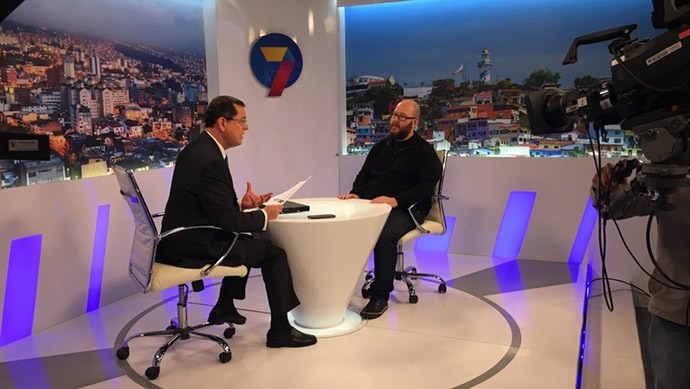
The week is almost over but the Mifos Innovation team is still hard at work in Ecuador.
The day started with the Innovation Team meeting with an organization that oversees a network of cooperatives. The biggest takeaway from the meeting was that the organization sees the value that the Mifo’s Financial Inclusion Cloud can bring to their network of financial institutions.
Continue Reading









 Always interested in public service, Smith decided to take a year off before college to volunteer abroad. She joined a gap year program with Project Trust where she worked at a boarding school for deaf children in Cairo, Egypt. While there, she started volunteering to help African refugees prepare for their resettlement interviews. “I became close friends with some of the refugees, some of whom were my age,” said Smith. “It really stuck me that I had essentially won the birth lottery. The difference in our circumstances was just that I was born in the United Kingdom as opposed to Eritrea, Somalia or Sudan.”
Always interested in public service, Smith decided to take a year off before college to volunteer abroad. She joined a gap year program with Project Trust where she worked at a boarding school for deaf children in Cairo, Egypt. While there, she started volunteering to help African refugees prepare for their resettlement interviews. “I became close friends with some of the refugees, some of whom were my age,” said Smith. “It really stuck me that I had essentially won the birth lottery. The difference in our circumstances was just that I was born in the United Kingdom as opposed to Eritrea, Somalia or Sudan.” Deciding she wanted to move beyond medical emergency relief, Smith left MSF and went to work for IRC where she has been for the last thirteen years. She has held a variety of roles and worked in various countries, including Sudan, Congo, Philippines, Nigeria and Iraq. She has also done advocacy and policy work for IRC in Washington, D.C.
Deciding she wanted to move beyond medical emergency relief, Smith left MSF and went to work for IRC where she has been for the last thirteen years. She has held a variety of roles and worked in various countries, including Sudan, Congo, Philippines, Nigeria and Iraq. She has also done advocacy and policy work for IRC in Washington, D.C.

 Educating people is vital to global development efforts. While there have been tremendous strides in improving access and quality of education throughout the world, 124 million children are still out of school and 757 million adults, two-thirds of whom are women, cannot read or write. The success of Millennium Development Goal 2 (MDG2), which aimed to accelerate progress in achieving universal primary education by 2015, has brought primary school enrollment up from 52 percent in 1990 to almost 91 percent in 2015. However, large disparity remains among poor and rural households and conflict-ridden areas.
Educating people is vital to global development efforts. While there have been tremendous strides in improving access and quality of education throughout the world, 124 million children are still out of school and 757 million adults, two-thirds of whom are women, cannot read or write. The success of Millennium Development Goal 2 (MDG2), which aimed to accelerate progress in achieving universal primary education by 2015, has brought primary school enrollment up from 52 percent in 1990 to almost 91 percent in 2015. However, large disparity remains among poor and rural households and conflict-ridden areas. There is an
There is an  While buildOn provides communities with funding, certain building materials, skilled labor, and project supervision, it’s the local people who build each school and are responsible for its long-term maintenance. In fact, among the communities where buildOn works, nearly 1.5 million volunteer work days have been contributed by community members. The Ministry of Education supplies the resources for each school, i.e. teachers, curriculum and books. Hedin believes this methodology is key to buildOn’s success. “Our methodology is our biggest strength,” she said. “Our partnerships with the communities and ministries is what helps us build sustainable schools, and that is what this is all about — sustainability.”
While buildOn provides communities with funding, certain building materials, skilled labor, and project supervision, it’s the local people who build each school and are responsible for its long-term maintenance. In fact, among the communities where buildOn works, nearly 1.5 million volunteer work days have been contributed by community members. The Ministry of Education supplies the resources for each school, i.e. teachers, curriculum and books. Hedin believes this methodology is key to buildOn’s success. “Our methodology is our biggest strength,” she said. “Our partnerships with the communities and ministries is what helps us build sustainable schools, and that is what this is all about — sustainability.” buildOn is doing more than educating children. In 1998, the organization started an adult literacy program in five countries, and it will soon expand to a sixth. Evening classes are held at buildOn schools and provide adults with basic literacy and numeracy skills. According to Hedin, nearly 70 percent of the adults who participate in these classes are women. “It is incredible to see these women attending classes because they have very long days, and so much responsibility,” she said. To date, over 120,000 children, parents and grandparents are attending buildOn schools.
buildOn is doing more than educating children. In 1998, the organization started an adult literacy program in five countries, and it will soon expand to a sixth. Evening classes are held at buildOn schools and provide adults with basic literacy and numeracy skills. According to Hedin, nearly 70 percent of the adults who participate in these classes are women. “It is incredible to see these women attending classes because they have very long days, and so much responsibility,” she said. To date, over 120,000 children, parents and grandparents are attending buildOn schools. “A pilgrim is someone who knows where he or she is going. Someone who is headed somewhere. The destination makes the pilgrim.” Dorothy Echodu, CEO of
“A pilgrim is someone who knows where he or she is going. Someone who is headed somewhere. The destination makes the pilgrim.” Dorothy Echodu, CEO of  “I think it is fair to say Pilgrim Africa restored hope to the hopeless when it was able to deliver lifesaving medicines to families in the camps; when it resettled families giving them the ability to restart their lives after years in the camps; when it provided an educational opportunity to children with no hope of getting secondary education; and when it energized the community and government to defeat malaria,” said Calvin. “All of these things give the community hope.”
“I think it is fair to say Pilgrim Africa restored hope to the hopeless when it was able to deliver lifesaving medicines to families in the camps; when it resettled families giving them the ability to restart their lives after years in the camps; when it provided an educational opportunity to children with no hope of getting secondary education; and when it energized the community and government to defeat malaria,” said Calvin. “All of these things give the community hope.” Dorothy also leads Pilgrim Africa’s malaria eradication work. In 2007, Uganda experienced severe flooding and Pilgrim Africa feared malaria would become a huge problem. “That was the beginning of our work in malaria and since then we have gotten incredible passionate about it,” she said. “We really feel malaria is holding the nation hostage and yet it is fully treatable and preventable.” In May 2016, Pilgrim Africa received a $2.49 million grant from the Bill and Melinda Gates Foundation to continue its innovative malaria eradication efforts.
Dorothy also leads Pilgrim Africa’s malaria eradication work. In 2007, Uganda experienced severe flooding and Pilgrim Africa feared malaria would become a huge problem. “That was the beginning of our work in malaria and since then we have gotten incredible passionate about it,” she said. “We really feel malaria is holding the nation hostage and yet it is fully treatable and preventable.” In May 2016, Pilgrim Africa received a $2.49 million grant from the Bill and Melinda Gates Foundation to continue its innovative malaria eradication efforts.







 After 15 years at PATH, most recently serving as interim Country Program Director for PATH India, along with extensive education, training and a passion for global health, Evan Simpson is embarking on a new journey. As the new President of
After 15 years at PATH, most recently serving as interim Country Program Director for PATH India, along with extensive education, training and a passion for global health, Evan Simpson is embarking on a new journey. As the new President of 

